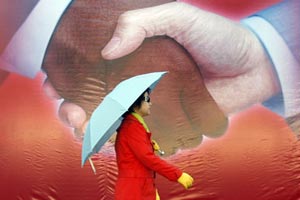
China’s textile industry looking for greener pastures in Africa
YarnsandFibers News Bureau 2014-12-22 17:32:00 – MumbaiRising labour costs, raw materials and slowdown has been staring at textile industry in China for quite some time now. And a move to expand outside China is also discernible to wade of from high cost of production. The most chased location to relocate is Africa attractive for companies in terms of costs and market access.
In China, wage have reached US$600 on an average paid to almost 23 million textile workers As a labour-intensive industry, garment making faces huge pressure on persistent soaring cost of labour in China. Minimum wage has been growing at the rate of 10 per cent per annum. Industry has also cautioned that by only offering the minimum wage, one can never recruit a skilled worker.
Not only labour cost, growth has also slowed down. According to Wang Tiankai, Director, China National Textile and Apparel Council, the momentum of China's textile industry has slowed significantly since 2011. From 2000 to 2010, the average growth was 18.8 per cent and has dropped to 12 per cent since then.
Moreover, price of high-quality cotton in China is about 30 per cent more than the international level, which resulted fiber processing dropping by 26 per cent last year.
Major garment makers are reacting differently to these challenges. Two strategies emerge; moving to Africa or Southeast Asia for low-cost labor, or continuing in China to produce premium value added products.
In case of first strategy, the Yuemei Group, established in Zhuji, Zhejiang province, in 1992, has foothold in seven African countries including Nigeria, Ghana and Tanzania, and has reportedly hired about 2,600 African workers. Accordomg to Xu Zhiming, Chairman, Yuemei Group currently generates 40 percent of its business from operations in Africa and the rest from China. "Africa will definitely be the manufacturing center of the world in the future," said Xu.
Investments from China are welcome in African countries. Morocco, for one, is vividly scouting for Chinese capital and technology. Under Morocco's 2009 industrial development plan, it would attract foreign investment to help develop six major industries, and textile high on the agenda. The Moroccan Investment Development Agency says most garments made in Morocco are exported to Europe or the USA earning foreign exchange of about Euro 4 billion (US$4.95 billion) every year. Most of the products are fast-fashion or ready-to-wear garments.
According to Mohamed Tazi, Director, Moroccan Association of Textile and Apparel Industries, Chinese garment producers can look to gain better access to European, African and other markets if they set up factories in Morocco. They can take advantage of the country's strategic position at the crossroads of the main trade routes linking Africa and Europe, as well as its free trade agreements with the United States, the EU, Turkey, Jordan, Tunisia and West Africa.
Some textile majors opted the second option. They opined that China's textile industry is yet to approach its sunset, and instead of relocating, have planned major expansion. For example, Esquel Group, Hong Kong-based garment-maker established in 1978, has plans to invest Yuan 2 billion (US$325 million) to set up a new factory in Guilin, Guangxi Zhuang region. Esquel runs a complete value chain - cotton growing, spinning, weaving, dyeing, sewing, and retailing. It is the largest cotton shirt maker in the world in terms of output. John Cheh, Vice-chairman and CEO, Esquel, believes that rising wages mean improved skills, higher efficiency and improved consumption power among Chinese people.
Aaron Lee, chief operating officer of Esquel, thinks of optimizing the process and adding value than of chasing after cheap labor. Esquel makes only high-end shirts for international brands like Zara, Ralph Lauren, Tommy Hilfiger, Nike and Muji, as well as some high-end domestic brands in China, so the margin is higher than in making simple T-shirts.
Over the years, China has transformed from manufacturing cheap garments to a major supplier for international brands, so being in the country also means being close to the most dynamic market. The fast changing consumer taste in China means brands have to keep innovating by creating new designs and new functions, which raises new requirements for garment manufacturers.
Wang of the textile council suggests companies innovate more with new materials so they are able to come up with more functional materials. Textiles is the only industry in which China has a strong advantage over its competitors across the world, and that is a very good reason to keep it alive believes Wang.
Market Intelligence
Ask for free sample Report

experience
Customer Base
dedicated team
Countries Served Worldwide









